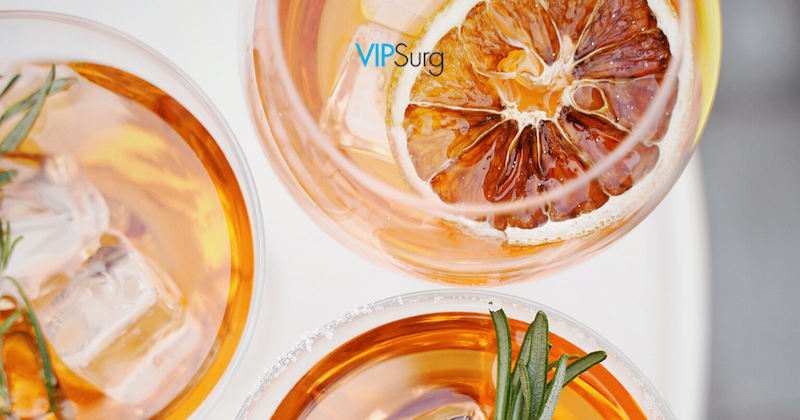Alcohol and Bariatric Surgery

One of the simplest but most common phrases we tell our patients is “everything in moderation” and this also applies to alcoholic beverages. However, there are some hard and fast rules that must be understood in the immediate postop timeframe that can prevent serious complications and discomfort.
First, it is important that in the months after surgery, you do not drink alcohol. This is primarily because alcoholic drinks can add hundreds of empty calories. A bottle of beer can add upwards of 150 calories (and discomfort from the carbonation), a glass of wine, upwards of 125 calories and mixed drinks can add hundreds of calories and quite a bit of sugar.
Second, and this is particularly true for gastric bypass patients, but applies to all bariatric patients, when you begin drinking alcohol again, you have to be aware that your gastrointestinal system has been altered, which includes how you metabolize alcohol. Prior to surgery, the alcohol that you drank would sit in the stomach for a time, being metabolized, before entering the small intestine where absorption is much more intense. After bariatric surgery this may change, and alcohol may enter the sensitive lining of the intestinal tract sooner. This is especially true for gastric bypass patients whose pyloric valve – the bridge between the stomach and small intestine – is cut away and rebuilt
The result is the potential for becoming inebriated much more quickly without realizing it. This may not only cause a potentially dangerous excess alcohol situation, but even one drink can place you over the limit, causing legal problems or an accident if you are operating machinery or a car under the influence.
So how do we enjoy alcohol after bariatric surgery?
Most important is knowing when to stop. This will most certainly be sooner than before surgery. So, start with a quarter of a serving of alcohol and see how it affects you. You can slowly move up from there. Be very attuned to your response and even ask a spouse or trusted friend for their take on how you are coping with your alcohol consumption.
Second, is all about moderation. Alcohol is a diuretic which means it flushes water out of your system, it is often mixed with very sugary additives for cocktails – not good for your diet – and it is an irritant, which can make you feel miserable after consuming it, especially on an empty stomach.
Then there is the potential concern for addiction substitution. Remember that food likely filled a void in your life and may have been the comfort you took during hard times. Conversely, it may have been the way you celebrated during the good times. When you do not have that comfort in your life any longer, there is the potential for other substances to take its place and fill that void. Ideally, you fill that void with new activities, exercise, being able to play with your kids or grandkids, exercising and more. But, a small number of patients may actually engage in destructive activities such as alcohol or drug consumption to make themselves feel better. The best way to identify, and hopefully avoid this circumstance, is to speak very candidly with friends and family around you and let them be advocates for your continued health.
The bottom line is that in our society, and especially now during the pandemic, alcohol is something that many are using and abusing to feel better at the end of a long day or, unfortunately, cope with the stresses of their lives. Further, it’s very difficult to go to a party or get-together that has alcohol and not partake with the others around you. As such, we do not pretend that you will ever be able to eliminate alcohol entirely from your life. However, moderating and only drinking a little here keeps you on track, can make you feel more sociable and may avoid some dangerous situations.
Feel free to contact us or a support group friend to see how you can indulge once in a while in moderation without the potential pitfalls of consuming alcohol after bariatric surgery.



